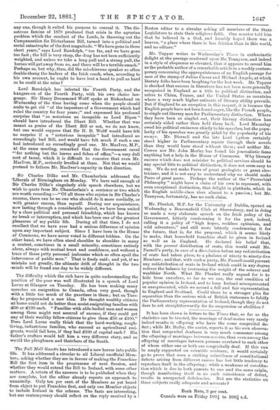Mr. Tupper writes to Wednesday's Times in enthusiastic delight at
the peerage conferred upon Mr. Tennyson, and indeed in a style of eloquence so elevated, that it appears to reveal him as the probable author of a remarkable article in a weekly contem- porary concerning the appropriateness of an English peerage for men of the stamp of Julius Caesar and Michael Angelo, at which literary folks have been laughing for the last week. Mr. Tupper is shocked that success in literature has not been more generally recognised in England as a title to political distinction, and refers to China, France, and the United States as countries where a very much higher estimate of literary ability prevails. But if England be an exception in this respect, it is because the English people have not been found eager, like the French people, to single out literary men for Parliamentary distinction. Where they have been so singled out, their literary distinction has certainly aided rather than held them back. Lord Macaulay owed his political eminence chiefly to his speeches, but the popu- larity of his speeches was greatly aided by the popularity of his essays. Mr. Disraeli and the late Lord Lytton certainly stood higher in Parliamentary repute through their novels than they would have stood without them ; and neither Mr. Cowen nor Mr. John Morley has found his journalistic fame anything but a help in the House of Commons. Why literary success which does not minister to political services should be any special title to political distinction, it does not seem easy to say. We do not make Peers of great geologists or great elec- tricians, and it is not easy to understand why we should make Peers of great poets. Perhaps the author of the " Proverbial Philosophy" might have a claim of his own to represent, with even exceptional distinction, that delight in platitude, which in the English middle-class rises almost to a passion; but Mr. Tennyson, fortunately, has no such claim.






































 Previous page
Previous page